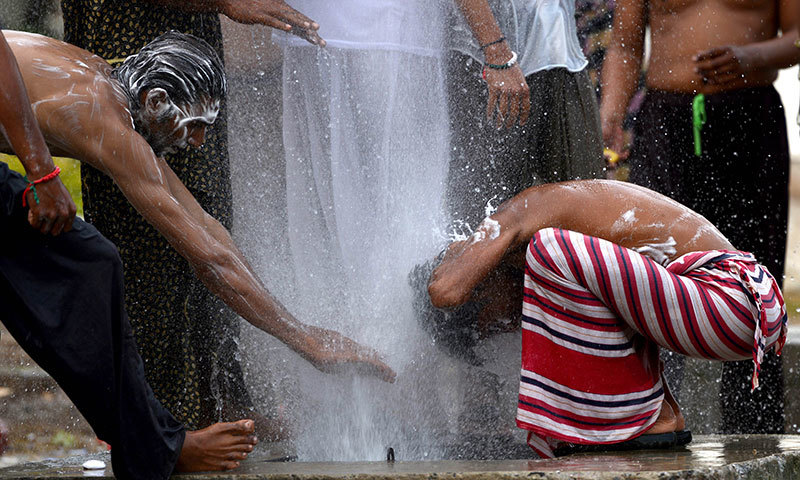ISLAMABAD: With thousands of police using classrooms as makeshift barracks between nightly deployments to parliament, students in the protest-hit federal capital have been forced to put their academic dreams on hold.
Police have been called in from around the country to handle the protest movement led by PTI Chairman Imran Khan and PAT chief Dr Tahirul Qadri. With no end in sight to a sit-in lasting more than one month, frustration is growing among the 34,000 affected students.
At the Islamabad Model Girls College, one of 27 institutions where officers have taken up residence, tables and chairs have been heaped into piles, damp laundry hangs on staircases and polystyrene food wrappings litter corridors.
Pre-medical student Atiqa Sajjad was told to report for class Monday, with a court-imposed deadline for the 30,000 police to vacate the buildings by September 23 set to expire – only to find burly constables still going about their business.
“They were walking in the corridors half-naked, some were shaving on the lawns and others were going to the shower or coming out of the bathrooms with towels hanging on their shoulders. It looked so weird,” she said.
As of Wednesday the schools remained occupied.
A spokesman of Islamabad Police, however, said earlier today that a private residence has been acquired to accommodate policemen, adding that the contingents would soon move there.
In a statement issued to the media, he said cleaning work was being carried out at the new place and upon its completion, schools would be vacated.
Khan and Qadri have set up camp cities in front of parliament hoping to force the resignation of Prime Minister Nawaz Sharif, whom they accuse of rigging last year's general election.
Their followers clashed with police in late August after they tried to storm the prime minister's residence, leaving three demonstrators dead and hundreds injured on both sides. On September 1, the opposition groups briefly occupied the state broadcaster.
The movement has since lost momentum, but with Sharif's resignation the main obstacle to a settlement, students from age six up to post-graduates are getting desperate for schools to reopen after summer break, which officially ended on August 11.
Humble backgrounds
Students at government institutions in Pakistan are by and large from poor to lower-middle class backgrounds whose parents cannot afford to send them to private colleges or abroad.
Tahira Jabeen, who hails from Pakistan's northern Hunza region and won a scholarship to study in Islamabad, said her parents were losing 12,000 rupees a month ($120) on her college accommodation while she sat idle.
She said she was growing anxious about missing valuable class time which could affect her exam performance.
“I am studying on scholarship and if I don't perform well in exams I will lose it. I can't afford to lose my scholarship – it's a lifetime opportunity.”
It's not just the students and their families who are fed up. Police constable Manzoor Elahi was visibly upset when asked how he was faring with his back-to-school experience.
“Do you think we are happy here? Who on earth would like to sleep on the bare floor in a room filled with the buzz of mosquitos?” he asked, adding that up to 100 police slept in each classroom.
A senior official of the Federal Directorate of Education told AFP that while police had left some schools, at others “they come back by night or return the next day,” adding around 34,000 pupils were currently affected.
Khan spokeswoman Anila Khawaja blamed the government for the situation.
“We are exercising our democratic right in a peaceful way and the government has asked the police to come in with no idea why,” she said.
Jabeen blamed both sides for putting their political concerns above the needs of ordinary people. “Neither Nawaz Sharif nor Imran Khan have any children in these schools … It's people like us, people from the lower middle class, who are suffering,” she said.















































